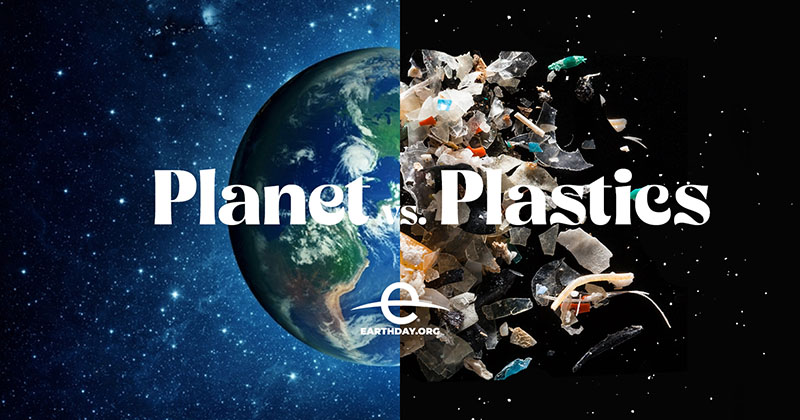Earth Day 2024 – A Call for No Plastics

As we gear up for Earth Day 2024, let's talk about a pressing issue: plastic pollution. This year, the focus of Earth Day is on a big goal - cutting plastic production by 60% by 2040. It's a challenge, but also an opportunity for all of us to think about our impact on the planet.
At HIPPO, while we handle waste removal, we're aware that the issue of plastic use and recycling isn't simple. Through this blog, we want to shed light on Earth Day's goals, the problems with plastic, and how we can all play a part in reducing plastic consumption.
The Perils of Plastic Pollution

Plastic is everywhere. It's convenient, cheap, and incredibly versatile. However, this widespread use is precisely the issue. Every year, millions of tonnes of plastic waste find their way into our oceans, landscapes, and even our food chain. The consequences? Devastating for wildlife, ecosystems, and potentially our health.
The goal for Earth Day 2024 isn't just ambitious; it's a necessary call to action. Reducing plastic production by 60% by 2040 aims to tackle this issue head-on. But why is this so crucial?
- Environmental Impact: Plastics take hundreds of years to decompose, polluting our environment for centuries.
- Wildlife Threat: Animals ingest or become entangled in plastic debris, leading to injury or death.
- Human Health: Microplastics have been found in our food, water, and even air, with research ongoing into their health implications.
Awareness is the first step. By understanding the scale and impact of plastic pollution, we can start to make informed decisions about our use of plastic in daily life. Whether it's choosing reusable options, supporting plastic-free initiatives, or simply being more mindful of our consumption, every action counts.
Understanding Our Impact

Acknowledging the role we all play in contributing to plastic pollution is crucial. Every plastic bottle not recycled, every disposable coffee cup tossed away, adds up, creating a mountain of waste that's tough to manage. It's a global challenge, affecting not just remote oceans and wildlife but our own communities and health.
For businesses like HIPPO, involved in waste removal, the reality of plastic waste hits close to home. We see the volume of waste generated and understand the importance of managing it responsibly. Yet, the solution isn't solely in better waste management. It's in rethinking our use of plastics altogether.
- Consumer Choices: Opting for reusable and sustainable products over single-use plastics can dramatically reduce waste. Simple switches in our daily routine, from using a reusable water bottle to reusing our own shopping bags, make a difference.
- Business Responsibility: Companies can assess their operations, supply chains, and product packaging, seeking ways to minimise plastic use. Active efforts in reducing plastic footprint set a positive example.
- Community Action: Participating in local clean-ups or recycling initiatives helps manage the plastic already in circulation. Education and community engagement are vital in spreading awareness and fostering a culture of reduction, reuse, and recycling.
As we contemplate our environmental footprint, it's clear that change is needed from all angles. While HIPPO's primary role might be in waste removal, we advocate for a broader perspective on tackling plastic pollution.
Taking Action: Practical Steps Toward Reduction

Understanding the gravity of plastic pollution is one thing; taking actionable steps to mitigate it is another. Both individuals and businesses can adopt strategies that significantly reduce their plastic footprint.
For Individuals:
- Refuse Single-Use Plastics: Start by saying no to single-use plastics like straws, cutlery, and packaging. It's a simple yet powerful way to reduce waste.
- Choose Reusables: Invest in reusable water bottles, coffee cups, and shopping bags. These items can dramatically cut down on your plastic consumption.
- Recycle Wisely: Be diligent about recycling. Understand your local recycling guidelines to ensure you're recycling effectively and not contaminating the process.
- Support Plastic-Free Products and Packaging: Where possible, choose products with minimal or no plastic packaging, and support businesses that prioritise sustainability such as plastic-free refill shops.
- Look for Certified B Corporations: Brands like smol, offer plastic-free house cleaning products delivered to your home, whereas Honest Mobile is a mobile network provider that reduces the need for a plastic SIM card for your phone.
For Businesses:
- Assess and Adapt Packaging: Evaluate your product packaging and logistics. Opt for sustainable, minimal, or reusable packaging solutions.
- Educate Your Team: Foster a culture of sustainability within your organisation. Educate employees on the impact of plastic pollution and encourage eco-friendly practices.
- Participate in Environmental Initiatives: Engage your business in community clean-ups, recycling programmes, or environmental advocacy. Corporate social responsibility enhances your brand while contributing to environmental sustainability.
- Innovate for Sustainability: If you're in a position to do so, invest in research and development for alternative materials that can reduce or eliminate the need for plastics in your products or operations.
Engagement and Advocacy:
Beyond personal and business practices, getting involved in broader advocacy and community efforts can amplify the impact. Participating in Earth Day events, signing petitions for policy changes such as the Global Plastics Treaty, or simply spreading awareness about the importance of reducing plastic use are valuable contributions to the cause.
On Course Towards a More Sustainable Future

The journey to reducing plastic pollution is ongoing, and while the challenges are significant, so are the opportunities for innovation and change. As we look towards a more sustainable future, it's important to recognise that every action counts, and collective efforts can lead to impactful results.
Innovation and Alternatives:
- Embracing innovative materials that offer alternatives to traditional plastics can revolutionise product design and packaging. From biodegradable options to plant-based plastics, the search for sustainable alternatives is gaining momentum.
- Supporting businesses that invest in sustainable practices and products not only drives demand for eco-friendly options but also encourages the industry to innovate further.
Policy and Change:
- Advocacy for stronger environmental policies plays a critical role. Supporting initiatives that aim to reduce plastic production and waste can help enforce systemic change.
- Engaging in dialogue with policymakers and participating in public consultations on environmental issues can amplify the call for action.
Community and Education:
- Community involvement is key. Participating in local environmental projects, such as supporting local sustainable businesses or beach clean-ups, fosters a sense of responsibility and connection to our environment and community.
- Education and awareness-raising about the impact of plastic pollution and the importance of sustainable living practices can inspire a new generation to prioritise the planet's health.
A Call to Action:
As we conclude, we invite you to join us in making conscious choices that support a plastic-free planet. Whether it’s through reducing your own plastic use, supporting eco-friendly businesses, or advocating for policy changes, your actions make a difference. Earth Day 2024 is a reminder of our shared responsibility and potential for positive impact.
Looking for Plastic-free Waste Removal?
Using our Man & Van Rubbish Removal service is a great way of having your bulky rubbish cleared, such as furniture, white goods, or office equipment, that has less impact on the environment. Our man and van team will come and load your waste into the back of a van, typically diverting from landfill over 95% of all waste collected through using our national partnership network of licensed waste transfer stations.

